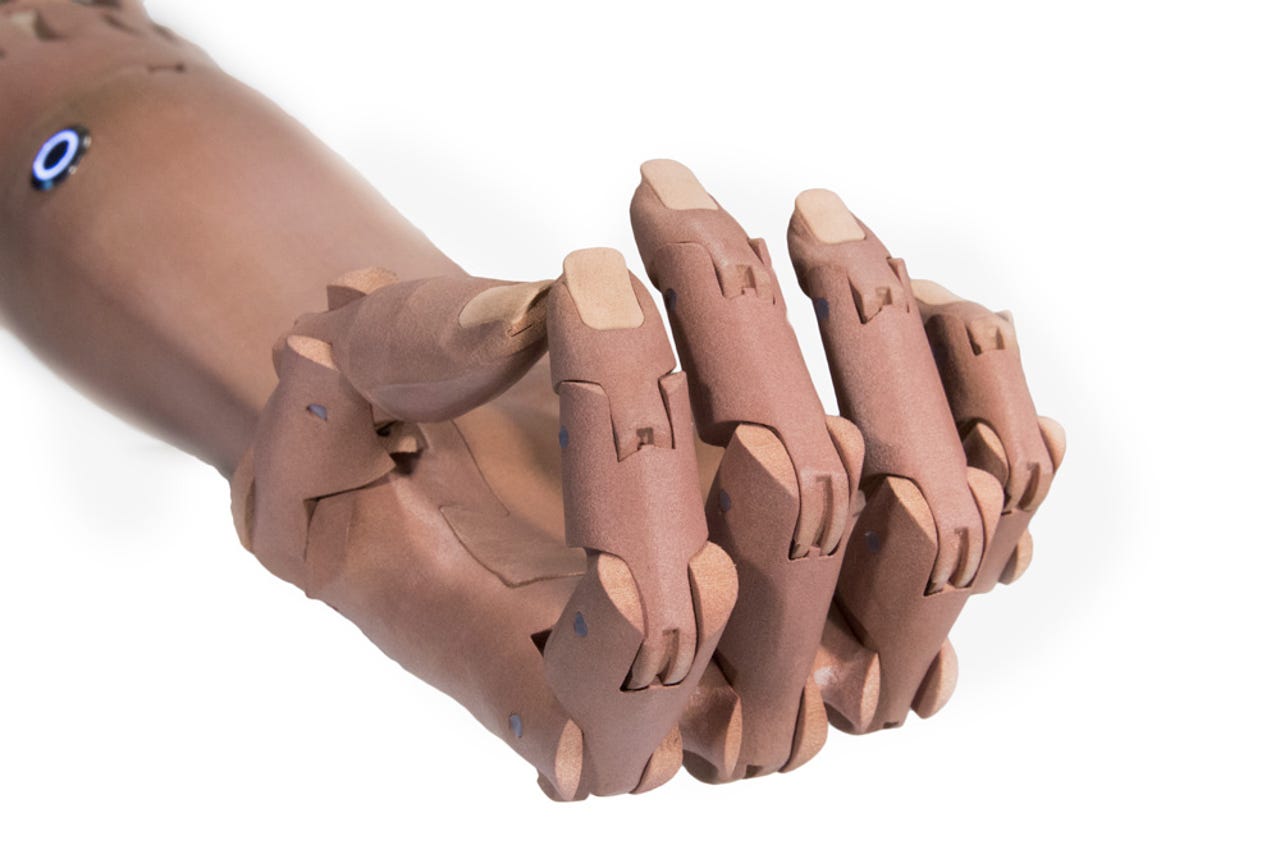































 Unlimited Tomorrow
Unlimited Tomorrow Here's the problem: Advanced prosthetics can improve the quality of life for amputees, but the devices are incredibly expensive. A company called Unlimited Tomorrow has created a process to solve for this, and in so doing, it's become an important test case for technology-driven manufacturing.
The problem isn't insignificant. Nearly 2,000,000 people live with limb loss in the United States, which records approximately 185,000 amputations each year, alone, per the Amputee Coalition.
Historically, amputees have been hard-pressed to find lightweight and comfortable prosthetics, intuitive and reliable, and, perhaps most importantly, affordable. These challenges are compounded for children with limb loss, as they're required to purchase multiple prosthetics as they grow. It costs an average of$80,000 per limb to keep a child outfitted with an appropriate prosthetic.
To make prosthetics that are tailored to individual amputees' needs, and particularly children, at a fraction of the cost, Unlimited Tomorrow Founder Easton LaChapelle has turned to emerging technologies, such as Siemens' 3D printing software. It's a game-changer.
"Until recently, all bionic prosthetic devices were produced using expensive tooling, molds, and materials," LaChapelle tells me. "This type of production limits the sizes and form factors that can be offered and adds cost. By nature, a prosthesis must be durable and robust because it is used daily. This has made it difficult to develop alternatives until 3D printing became an option. Other technological barriers include batteries and sensors used to control the prosthesis."
Interestingly, the story of how bionic devices are typically made is a story of the inefficiencies of manufacturing segmentation.
"We have found that a lot of the costs come from segmented manufacturers that all create different components that go into a device," explains LaChapelle. "Each of these manufacturers needs to make a margin, and overall, this increases the costs to the clinicians. Clinicians are critical to creating a sound prosthetic device. They work directly with the patients, create the socket (the most critical part of the device), and fabricate and assemble the final unit. These clinicians then need to bill the insurance companies to make their margin. When you add all of this together, you get expensive prosthetic devices."
If you're in the market for a 3D printer, you'll find one here that fits your needs.
Read nowTherefore technological improvements will help reduce these costs, but technology alone won't solve all the issues, a point that's often left out of glowing predictions of technology-driven manufacturing efficiencies. Unlimited Tomorrow identified cost structure as an issue early on and solved these challenges by developing its technology and manufacturing from the ground up. This allows the company to control costs very accurately. Unlimited Tomorrow has an in-house clinical team, as well as production and manufacturing teams. Having everything under a single roof allows the company to be very efficient, control quality across the board, and reduce costs tremendously compared to other companies and services.
By solving for segmentation and wholly owning its manufacturing, Unlimited Tomorrow is solving for the segmentation-induced costs. And of course, the very idea of a small enterprise owning its own manufacturing is a product of technology, part of the virtuous circle of technology enabling processes that drive new utilizations of technology.
Says LaChapelle, "3D printing, 3D scanning, and software have enabled us to produce prosthetic devices that are unique to each person (in terms of shape, size, and skin tone), extremely durable, lightweight, and affordable. The devices we make have comparable functionality to the most advanced devices on the market. Through a convergence of these technologies, we can offer them at the lowest cost within the bionic category."
Technology has also contributed to astounding customization. For example, Unlimited Tomorrow offers 144 skin tones, and the devices are custom-made in a mirror image of the end user's opposing limb. 3D scanning is used to capture the user's residual limb geometry, and new software and algorithms allow the company to create sockets instead of much costlier hand fabrication digitally.
Siemens, which put Unlimited Tomorrow on my radar, is playing a role in this manufacturing success story.
"Siemens' software is critical in our process. Their software takes in the raw 3D scan from our users and allows our clinical team and socket generation team to digitally fabricate and fine-tune sockets for a wide range of users. No two residual limbs are ever the same, and to have software that can account for that, while also making it easy enough for our team to produce sockets, is incredible."
Unlimited Tomorrow has created an upgrade program for children whose devices will become obsolete as they grow.
"We upcycle the quality and expensive components and create a new device for them at half the cost."
It's another example of the flexibility that an integrated manufacturing process brings, and it's a good illustration of how one company is able to serve such a variety of customers.
"Our youngest user is seven years old -- our oldest is 86 years old!" exclaims LaChapelle enthusiastically.
 Горячие метки:
3. Инновации
1. Робототехника
Горячие метки:
3. Инновации
1. Робототехника